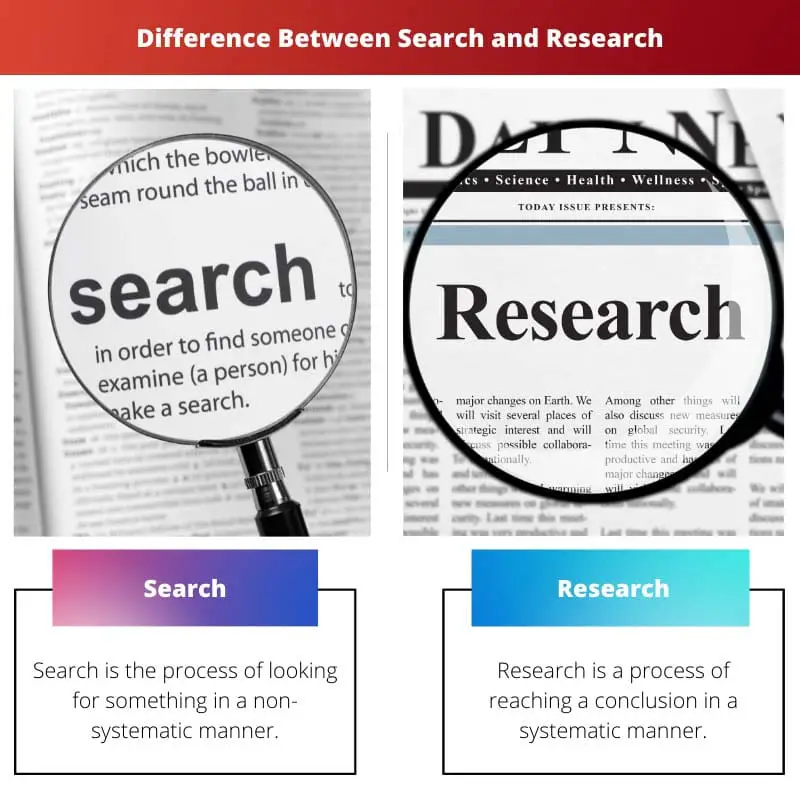Search, and research are two very commonly used terms in various conversations. They are confused for being the same thing, especially because of their similar composition in terms of spelling.
Key Takeaways
- Searching involves finding specific information or data, whereas research entails a systematic investigation to discover new knowledge or insights.
- Searches can be quick and superficial, while research requires in-depth analysis and critical thinking.
- Searching is a research component, as researchers search for existing data or information to inform their studies.
Search vs Research
Searching is the act of looking for information to address a specific question or problem, and can be done on a superficial level or more in-depth. Research is the systematic investigation and study of a particular topic or issue to gain a deeper understanding and knowledge.

Search is a random process of looking for something in a non-systematic manner. This could be done in order to find a solution for something, a missing object or simply an answer to a question.
On the other hand, research is a systematic method of reaching conclusions. It is done by collecting data and information, verifying it and then analysing it.
Comparison Table
| Parameters of Comparison | Search | Research |
|---|---|---|
| Meaning | Search is the process of looking for something in a non-systematic manner. | Research is a process of reaching a conclusion in a systematic manner. |
| Aim | The aim of searching is to find something. | The aim of researching is to reveal new information and establish a correct conclusion based on that. |
| Method | Searching does not include structured techniques. | Researching includes the collection of information, verification, analysis, and deduction. |
| Time Span | The process of searching for something is short. | The process of researching is long and complex. |
| Qualification | No qualification is required to search for something. | Generally, a qualification is required to carry out a research project. |
| Control | Searching is not monitored or regulated. | Research is monitored and regulated by someone other than the researcher. |
| Dependency | Search is not dependent on research. | Research is dependent on search. |
What is Search?
Search is a term used to describe the process of looking for something using random methods and techniques. The questions and results involved are not very complex or detailed.
If a person has lost a belonging, he would ‘search’ for it. If NASA sends a rover to Mars, it is because they are ‘searching’ for signs of life. Moreover, if you look up information on the internet, you have conducted a ‘search.
An important aspect of this is that anyone could conduct a ‘search’ at any place. A qualification or any other kind of threshold is not necessary.
Earlier, for gathering information or finding out answers, people used to give in to the methods of asking other people or looking for it in books.

What is Research?
Research is a systematic way of looking for something. It involves more complexity and detail, unlike when something is ‘searched’ for. However, to some extent, research is dependent on search.
If NASA ever found signs of life on Mars, the data of the search would be collected and analysed. It would then be used to establish certain facts and thereby reach a conclusion.
A certain qualification is required to carry out a research project. These qualifications are gained through PhD programs in which students are asked to conduct a thesis. In this, a student chooses a subject topic to work on.

Main Differences Between Search and Research
- A search is not monitored or regulated, whereas a senior monitors research.
- Search is not dependent on research, whereas research is dependent on search.

- https://psycnet.apa.org/record/1966-04301-001
- https://books.google.com/books?hl=en&lr=&id=_tTnCAAAQBAJ&oi=fnd&pg=PR3&dq=search+vs+research&ots=YCxhkVxrX3&sig=ZJ-0E78lY4LIuQGZpdoIjsr3oSA

This article provides a thorough and clear-cut summary of the differences between search and research.
The comparison table is a very helpful resource for anyone wanting to learn the key differences between searching and doing research.
I agree, it’s a great summary that really helps clarify the distinction between the two terms.
I don’t understand why so many people get these two terms confused, this is really a straightforward explanation.
This is a highly informative article that meticulously dissects the differences between searching and conducting research.
The article’s coherent and structured breakdown of these terms is indeed commendable.
This article does a great job in illustrating the various nuances between searching and conducting research.
Agreed, the comparisons and supporting examples enhance the reader’s understanding of these two processes.
The concepts are explained thoroughly in a systematic and organized manner. This is a highly informative article.
I couldn’t agree more, this is a great educational resource for anyone interested in learning about search and research.
The detailed comparison really makes it easy to grasp the distinctions between search and research.
The clear definitions and numerous examples in this article make it an exemplary piece for understanding the distinctions between search and research.
This article certainly merits praise for its comprehensive and lucid examination of search and research.
Absolutely, the article’s level of detail and illustrative examples really make the differences crystal clear.
This article provides a comprehensive explanation of the differences between search and research.
Absolutely, the breakdown of the concepts is very clear and easy to comprehend.
A very insightful article that effectively dissects the different aspects of search and research.